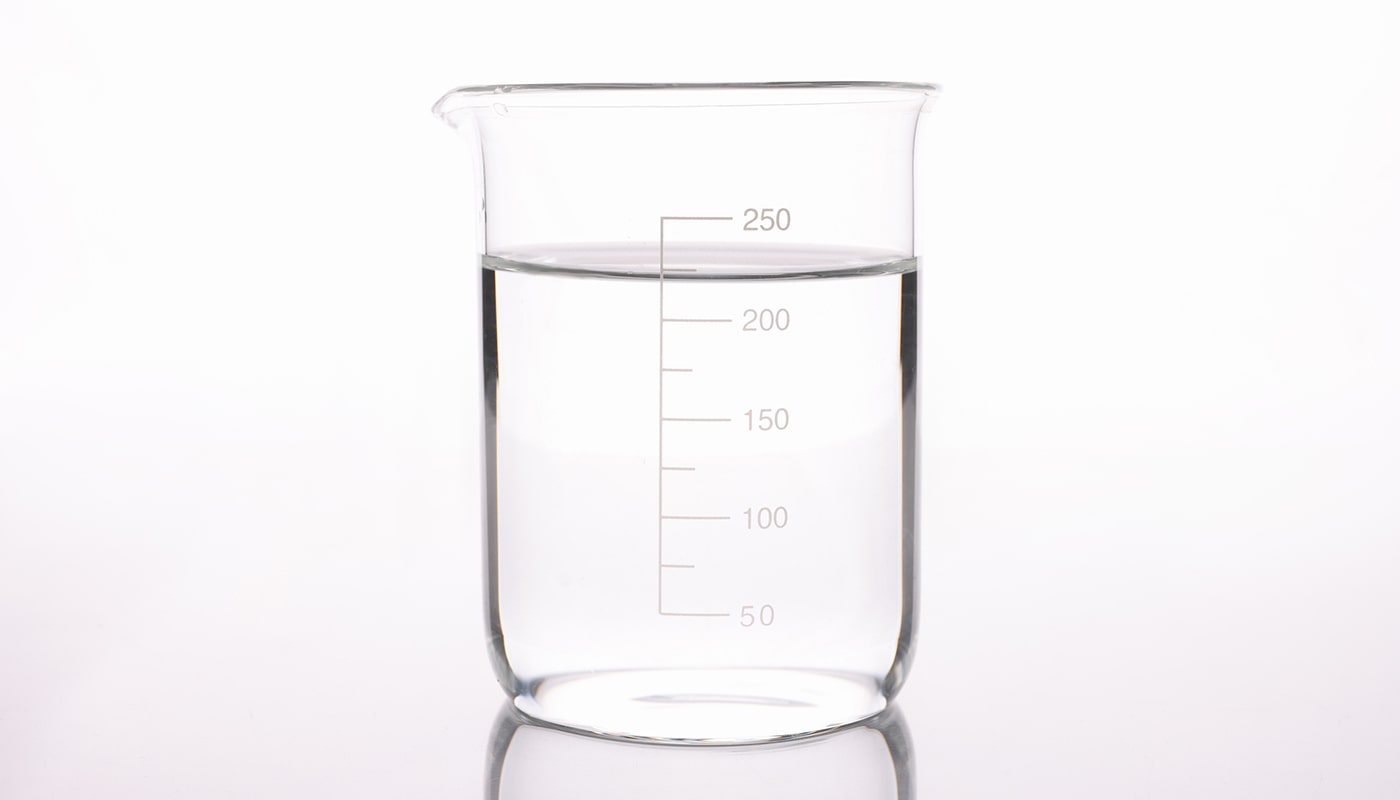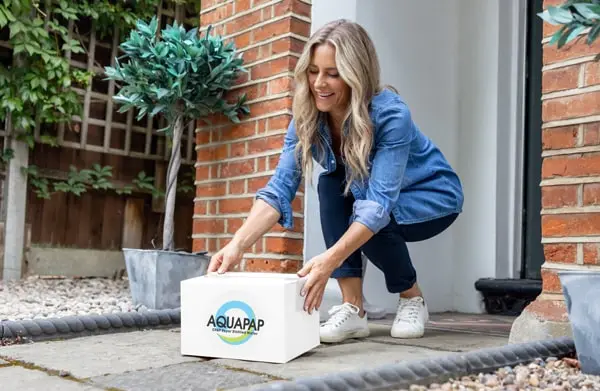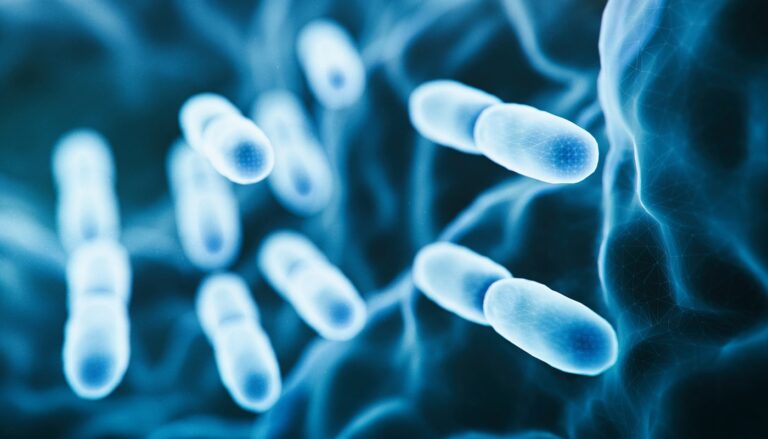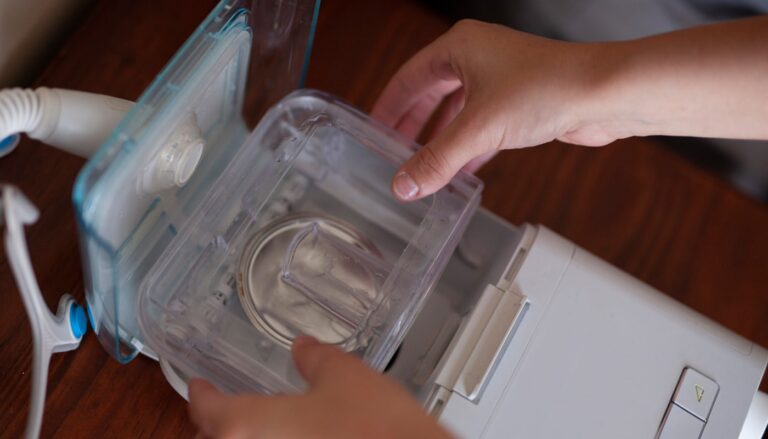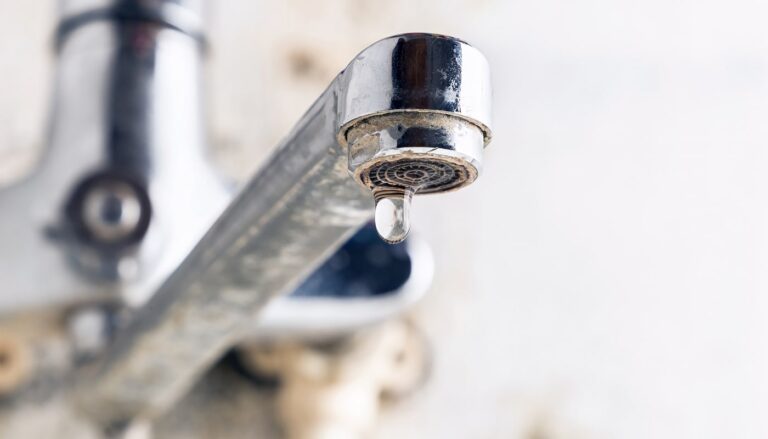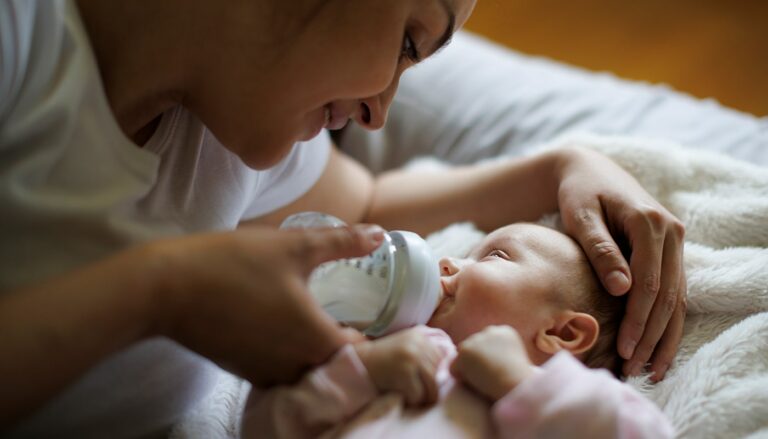Proper maintenance of your CPAP machine is essential for effective sleep therapy. One critical aspect of this maintenance involves using the right type of water in the humidifier. Vapor distilled CPAP water is recommended for CPAP machines due to its purity and lack of minerals.
Choosing distilled water for your CPAP machine offers several key benefits:
- Prevention of Mineral Buildup: Tap water contains minerals that can accumulate in your machine, leading to scaling and potential damage over time. Distilled water, devoid of these minerals, helps prevent such buildup.
- Reduced Risk of Pathogens: Non-distilled water may harbor bacteria or other pathogens that could compromise your health. Distilled water minimizes this risk, maintaining a cleaner and safer humidification system.
- Enhanced Comfort During Sleep Therapy: By using distilled water, you ensure a consistent level of moisture in the pressurized air delivered by the CPAP machine. This aids in alleviating dryness and irritation in the nasal passages and throat, enhancing your overall comfort during sleep.
Incorporating distilled water into your CPAP routine not only supports machine longevity but also plays a crucial role in ensuring effective and comfortable sleep therapy.
Understanding CPAP Machines
Continuous Positive Airway Pressure (CPAP) devices are essential tools in managing obstructive sleep apnea (OSA). They deliver a constant stream of air through a mask, keeping the airway open and preventing episodes of interrupted breathing during sleep. This function is crucial for improving sleep quality, reducing daytime sleepiness, and enhancing the overall health of individuals with OSA.
Types of CPAP Machines
- Standard CPAP: This type provides a fixed level of air pressure throughout the night. It’s commonly prescribed for patients who require a consistent pressure setting to maintain an open airway.
- Auto-CPAP (APAP): Unlike standard CPAP machines, APAP devices automatically adjust the air pressure based on real-time feedback from the user’s breathing patterns. This feature can enhance comfort by providing lower pressures when possible and increasing pressure when necessary.
- Bi-level Positive Airway Pressure (BiPAP): BiPAP machines offer two different pressure settings – a higher one for inhalation and a lower one for exhalation. These are often used by individuals who find it difficult to exhale against continuous pressure or those with more complex respiratory issues.
Components of a CPAP Machine
- Motor: The motor generates the airflow necessary to keep the airway open during sleep. It operates quietly to ensure minimal disruption to the user’s rest.
- Pressure Control Settings: These settings allow users to customize their therapy by adjusting the air pressure according to their specific needs, ensuring optimal comfort and effectiveness.
- Filters: CPAP machines typically include filters that clean the air before it is delivered to the user. The filters capture dust, smoke, and other airborne particles, contributing to better respiratory health.
Understanding these elements helps in choosing the right CPAP machine tailored to individual needs and ensures effective management of obstructive sleep apnea symptoms.
The Role of Humidification in CPAP Therapy
A CPAP humidifier is an important part of CPAP therapy. Its main job is to add moisture to the pressurized air that the machine delivers. This addition of moisture is essential for making sure users feel comfortable throughout their sleep therapy.
How Does the CPAP Humidifier Work?
1. Moisture Delivery
The humidifier works together with the CPAP machine to introduce moisture into the airflow. It does this by using a water chamber that gets heated up to produce vapor. This vapor then mixes with the air before it reaches the user’s airways.
2. Pressurized Air Enhancement
By adding moisture to the dry, pressurized air, the humidifier helps reduce any discomfort caused by breathing in dry air for long periods during sleep.
Why Is Humidification Beneficial?
1. Reduction of Dryness
One of the main benefits of using a CPAP humidifier is its ability to relieve dryness in both the nose and throat. Without this extra moisture, users may experience irritation or soreness due to continuous exposure to dry air.
2. Prevention of Congestion
Moist air can help prevent nasal congestion, making it easier for users to breathe naturally and comfortably throughout the night.
How Does Humidification Improve Comfort?
1. Enhanced Sleep Experience
Having moisture in CPAP therapy not only reduces dryness but also greatly improves overall comfort. Users often report sleeping better when their CPAP machines have effective humidification systems.
2. Customized Comfort Settings
Many modern CPAP machines allow users to adjust humidity levels according to their personal preferences and environmental conditions. This feature ensures that each individual can find their own optimal level of comfort.
Using a humidifier with your CPAP setup is crucial for keeping users comfortable and ensuring successful sleep therapy sessions. The combination of necessary pressure support and soothing moisture it provides is invaluable for those who depend on CPAP therapy for better health outcomes.
Why You Should Only Use Distilled Water in Your CPAP Machine
Using the right type of water in your CPAP machine is crucial for maintaining its performance and ensuring your health. Distilled water stands out as the best choice due to its purity and safety features.
Mineral Buildup and Its Impact
Non-distilled water, such as tap or filtered water, contains minerals that can accumulate over time in the humidifier chamber of your CPAP machine. These minerals can lead to a variety of problems:
- Scaling and Residue: Minerals left behind after the evaporation of water form a crusty layer known as scaling. This residue can affect the efficiency and lifespan of your CPAP machine.
- Clogs and Malfunctions: As mineral deposits build up, they may clog hoses or other components, causing performance issues that may require costly repairs or replacements.
- Increased Maintenance: Frequent cleaning is required to remove these deposits, adding unnecessary hassle to your routine.
Pathogens and Health Risks
Tap water is not only rich in minerals but can also be a breeding ground for pathogens. These microorganisms pose significant health risks if inhaled through your CPAP device:
- Waterborne Illnesses: Tap water can contain bacteria, fungi, or viruses that thrive in a warm, moist environment like a CPAP humidifier. Breathing in these pathogens could lead to respiratory infections or other health complications.
- Reduced Respiratory Health: The presence of pathogens compromises the air quality delivered by your device, potentially affecting your sleep therapy effectiveness.
Benefits of Distilled Water for Your CPAP
Distilled water is recommended for CPAP machines due to several advantages:
- Absence of Minerals: With virtually no mineral content, distilled water prevents scaling and minimizes the risk of clogs within the machine components.
- Pathogen-Free: The distillation process eliminates bacteria, viruses, and other contaminants, reducing the risk of illness from contaminated water.
Choosing distilled water ensures optimal performance, extending the life of your machine while safeguarding your health during sleep therapy. It represents an investment in both comfort and peace of mind.
By consistently selecting distilled water for your CPAP equipment, you protect yourself from potential hazards linked with mineral buildup and pathogen exposure. This choice enhances the reliability and functionality of your device while contributing to an uninterrupted sleep therapy experience.
Alternatives to Distilled Water for Your CPAP Machine
When considering alternatives to distilled water for your CPAP machine, you might encounter purified and filtered water as potential options. While these types of water may appear similar to distilled water, they come with their own set of limitations.
Purified Water:
- Purified water undergoes processes like reverse osmosis and deionization, reducing impurities. Despite this refinement, purified water might still contain trace minerals or contaminants.
- Using purified water in a CPAP machine can lead to mineral deposits over time, similar to those caused by tap water, potentially affecting the machine’s performance.
Filtered Water:
- Filtered water typically passes through carbon or sediment filters, which remove larger particles but may not eliminate all dissolved solids or impurities.
- Although it’s a cleaner option than tap water, filtered water can still harbor residual minerals and impurities that might contribute to buildup in the CPAP device.
Both purified and filtered waters fall short of the purity levels achieved by distillation. This leaves room for misconceptions regarding their suitability for CPAP machines. The absence of complete mineral removal means they cannot match distilled water in terms of minimizing scaling risks and ensuring optimal hygiene within your device.
Proper Maintenance Practices for Your CPAP Machine
Ensuring your CPAP machine remains in optimal condition involves regular machine maintenance and strict adherence to hygiene practices. Routine cleaning not only supports the longevity of your device but also enhances its performance, contributing to a more effective sleep therapy experience.
Key Maintenance Steps:
- Daily Cleaning: Clean your CPAP mask, tubing, and water chamber every day. This prevents the buildup of oils and bacteria, ensuring that each session is hygienic.
- Weekly Deep Clean: Once a week, disassemble your CPAP machine components, except for the motor. Wash them with mild soap and warm water, rinse thoroughly, and allow them to air dry.
- Filter Replacement: Depending on the model of your CPAP machine, filters should be checked weekly and replaced monthly or as per manufacturer guidelines. This maintains air quality by preventing dust accumulation.
- Water Chamber Care: Always empty and rinse out the humidifier’s water chamber daily to avoid mineral deposits and contamination.
Neglecting these maintenance routines can lead to several issues such as unpleasant odors, reduced efficiency, or even respiratory infections caused by mold or bacteria. By incorporating these practices into your routine, you ensure that the CPAP machine functions smoothly, providing you with safe and comfortable therapy every night.
Where to Buy Distilled Water for Your CPAP Machine?
Accessing reliable sources of distilled water is crucial for maintaining your CPAP machine’s longevity and ensuring safe therapy. While there are various options available, specialized CPAP water delivery services like Aquapap have revolutionized how users maintain their water supplies.
Why Choose a Specialized CPAP Water Service?
Traditional distilled water sources may not always meet the stringent requirements for premium CPAP water use. Specialized services offer several distinct advantages:
- Guaranteed Purity Levels: Water undergoes rigorous testing to meet medical-grade standards
- Specialized Processing: Vapor-distillation technique removes 99.9% of contaminants
- Quality Assurance: Each batch is tested for mineral content and purity
- CPAP-Specific Packaging: Ergonomic containers designed for easy pouring into CPAP chambers
Aquapap’s Comprehensive Service Features
Aquapap has tailored their service to address specific CPAP user needs:
Delivery Options
- Flexible Scheduling: Choose weekly, bi-weekly, or monthly deliveries
- Smart Delivery System: Automated tracking ensures timely replacements
- Vacation Holds: Easily pause service during travel periods
- Emergency Delivery: Rush shipping available when needed
Subscription Benefits
- 15% savings on regular deliveries
- Free shipping on orders over $50
- Priority customer support
- Automatic filter reminder services
Pro Tip: Always keep a backup supply of distilled water on hand. Industry experts recommend maintaining at least a two-week reserve supply for uninterrupted therapy.
